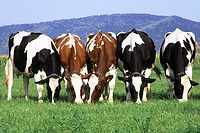A collaborative study involving Michigan State University and various animal scientists, epidemiologists, farmers, graduate students, microbiologists, undergraduates and veterinarians has provided to insight that could help to decrease the number of Escherichia coli illnesses.
Researchers found that cattle experiencing heat exhaustion and energy loss from milk production were significantly more likely to shed Shiga toxin-producing Escherichia coli – or STEC – a type of E. coli. Shedding is the process of bacteria exiting the body. This might be via the respiratory tract, the genital tract, or in the case of cattle, the intestinal tract through their feces.
With this new insight, the food safety industry can pinpoint better prevention practices to reduce the prevalence of E. coli, which causes approximately 100,000 illnesses, 3,000 hospitalizations and 90 deaths each year in the U.S.
The joint study is published in Applied and Environmental Microbiology, a journal of the American Society for Microbiology.
Sign up for Food Safety Magazine’s bi-weekly emails!




